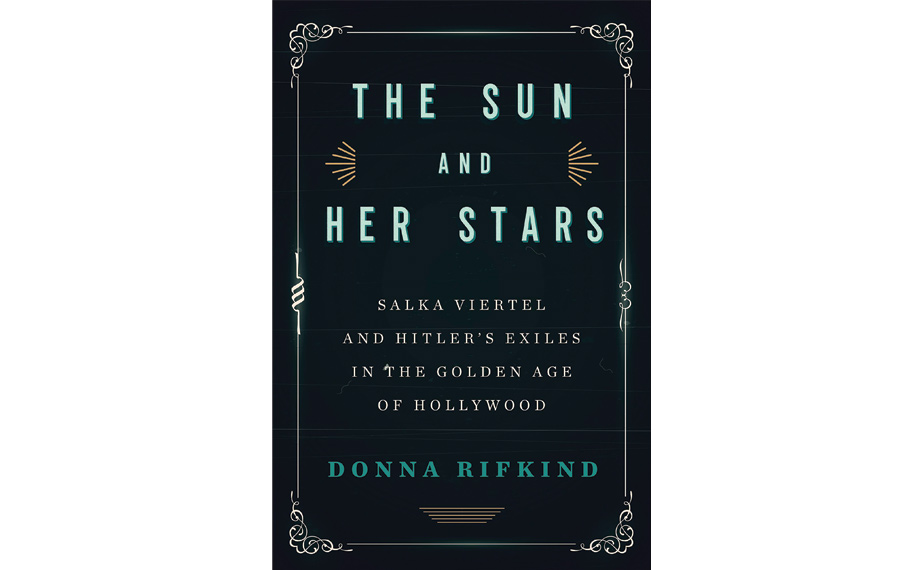
Salka Viertel was the highest-paid screenwriter at MGM during the 1930s. She was Greta Garbo’s lifelong best friend. And, thanks to the social gatherings that she hosted in her home on Mabery Road in Santa Monica Canyon, Charlie Chaplin likened her to “the great eighteenth-century hostess Madame de Staël.” And yet she has been almost entirely overlooked in the ongoing celebration of Hollywood in its Golden Age.
At least until now.
“The Sun and Her Stars: Salka Viertel and Hitler’s Exiles in the Golden Age of Hollywood” by Donna Rifkind (Other Press) is a superbly written account of her life in full, starting with Salka’s privileged childhood in the Austro-Hungarian Empire and ending with her bittersweet postwar return to Europe, where she died in 1978. Above all, however, Rifkind’s new book is a brilliant evocation of a time and place that figures crucially in the history-soaked era that included the rise and fall of Weimar Germany, the Great Depression, the advent of Hitler and Stalin, World War II and the McCarthy era.
To put Salka Viertel into context, Rifkind reminds us that “the look, the sound, and the speech of Hollywood’s Golden Age did not originate in Hollywood.” Rather, many of the most enduring and distinctive American movies were made by refugees from Nazi-occupied Europe. “All were antifascists; a few were Communists; most were Jews,” Rifkind explains. “These were Hitler’s gift to America.” Many of these makers and shakers of Hollywood, as it happened, gathered on Sundays at the home of Salka and her husband, director and screenwriter Berthold Viertel, for camaraderie.
The house on Mabery Road serves as a kind of leitmotif in the life of Salka Viertel. She is best remembered, when she is remembered at all, as a salonnière. Over a quarter-century, her guests ranged from Christopher Isherwood and Billy Wilder to John Huston and John Houseman, from Shelley Winters and Montgomery Clift to James Agee and Norman Mailer. Yet she often experienced the house as an affliction: “The house is a sort of Shangri-la for everyone who enters it, built on my enslavement,” she wrote in a letter to her husband. Repeatedly faced with foreclosure, she managed to keep the house only because of loans from Chaplin and screenwriter Donald Ogden Stewart.
Donna Rifkind reminds us that “the look, the sound, and the speech of Hollywood’s Golden Age did not originate in Hollywood.” Rather, many of the most enduring and distinctive American movies were made by refugees from Nazi-occupied Europe.
Salka (nee Steuermann) herself was “a galitzianer Jewess” who achieved her first success on the stage in Weimar Germany. After her marriage to Berthold, the couple and their three young sons managed to reach America in 1928, five years before the Nazis came to power. California was a place of mystery to her family back in Europe. “Are there snakes on the beach?” her mother asked in a letter. “How is it that such splendid fruit grows in the desert?” Salka herself quickly mastered the new world in which she found herself, and she put herself in service to her fellow refugees.
“Salka Viertel has been more or less forgotten in America because too few people believed that what she accomplished was important,” Rifkind explains. “To survive and flourish in the hostile environment of the Hollywood studio system; to use her influence at the studios to petition for sponsors, affidavits, and jobs for
refugees; to turn her home into the endpoint of a transatlantic network for those refugees, providing welcome, food, shelter, camaraderie, and introductions to potential employers; to speak out against intolerance, censorship, political inquisitions, and the curtailing of human rights in the name of national security — all seeds of fascism in the United States that threatened to sprout as poisonously as they had in Germany.”
Rifkind is an open-eyed and utterly candid biographer. She reports that Salka was defamed by Kurt Weill in a letter he wrote to his wife, Lotte Lenya, as “a money-grubber, a vengeful lesbian, an incompetent fraud, and a horrible witch.” But Rifkind also finds it within herself to forgive these harsh words on the grounds that “distraught refugees were brittle, often depressed, and prone to lashing out at friends and benefactors.” Indeed, Rifkind reminds us that survivors like Salka Viertel could not afford softness or sentimentality.
“Salka had a strong, confident personality and wielded a degree of influence, for a time, in a Hollywood embittered by chronic discord, frustration, jealousy, and misogyny both casual and institutional,” the author writes. “Never prone to self-pity or cowering, she learned early that survival in Hollywood required a thick skin, and toughened herself up accordingly.”
Rifkind encountered some of that misogyny in her own research. She found her way to Salka’s letters and diaries at “the extraordinary center for exile literature called the Deutsche Literaturarchiv” in Germany, where one of the archivists told her, “We’re so glad you are here for Salka. Almost everyone comes for Berthold.” And she observes that “Salka’s famous friends, including Thomas Mann and Bertolt Brecht, [did not] feel much compunction to mention Salka in their memoirs or diaries beyond an occasional reference to the excellent coffee and cake she served them.”
Rifkind is a journalist whose work has appeared in The Wall Street Journal, The New York Times and The Washington Post, among other publications, but she emerges in “The Sun and Her Stars” as a master of the biography. Her book is always graceful and lyrical, and she deftly leads her readers back and forth through the poignant tale that she tells. And when Rifkind praises Salka’s “uncompromising conviction and generosity,” she also reminds us that the same qualities are to be found in her book.
Jonathan Kirsch, attorney and author, is the book editor of the Jewish Journal.























 More news and opinions than at a Shabbat dinner, right in your inbox.
More news and opinions than at a Shabbat dinner, right in your inbox.